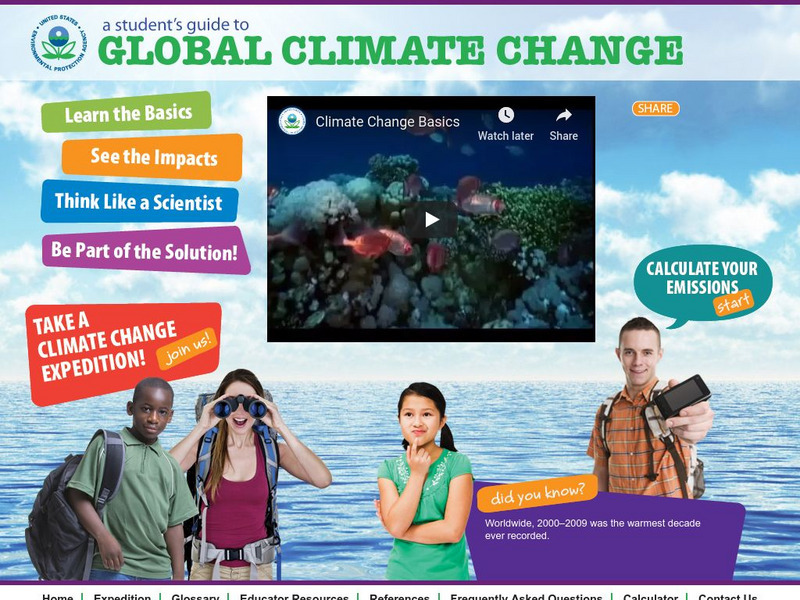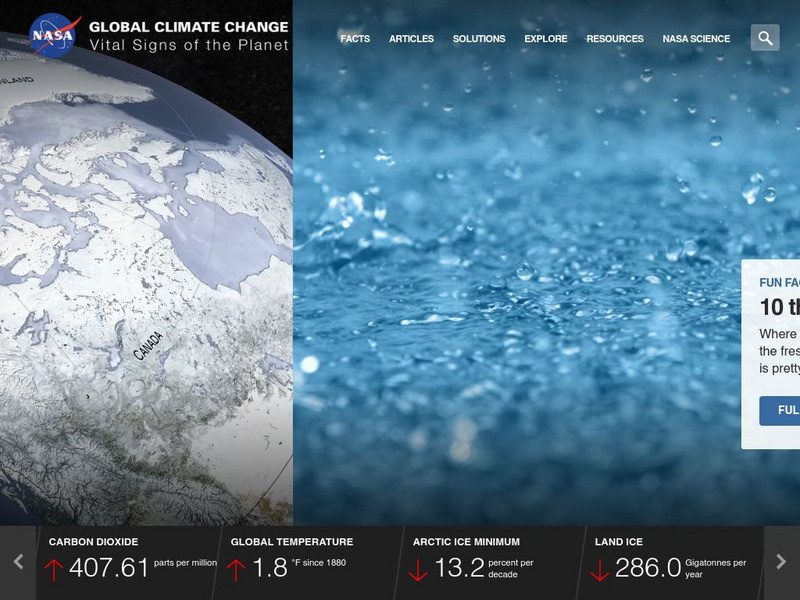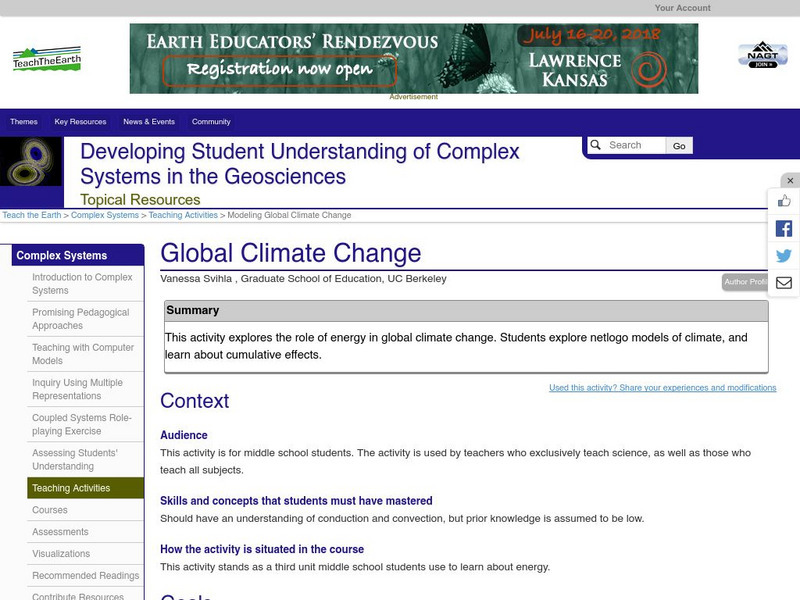Hi, what do you want to do?
Curated OER
America the Beautiful
Students listen to a read-aloud discussing the landmarks of the United States. In pairs, they use the internet to research a landmark of their choice. They create a visual aid to be given with a presentation sharing the information...
Curated OER
International and Development Banking
Students engage in a lesson plan that is concerned with the concept of banking in a local and international marketplace. They conduct research using a variety of resources with the end result being a demonstration of a flowchart of how...
Curated OER
Daisyworld: Interactive On-line PC and Mac
Students use a JAVA interface to explore the Daisy World model to illustrate a mechanism through which - according to the Gaian hypothesis - biota might optimize their abiotic environment by means of negative feedback.
Curated OER
Using My Nasa Data To Determine Volcanic Activity
Students use NASA satellite data of optical depth as a tool to determine volcanic activity on Reunion Island during 2000-2001. They access the data and utilize Excel to create a graph that has optical depth as a function of time for the...
Curated OER
Major Ocean Surface Currents
Students investigate wind driven surface currents and prevailing winds by playing a card game. The cards are sorted by north or south and Atlantic or Pacific. They then predict where the two currents are found and what their...
Curated OER
Cultures around the World
Students explore Canadian culture. For this Canadian Culture lesson, students participate in a general discussion about Canada, then create a symbol for Canada as part of a class collage.
Curated OER
Equator, North Pole, and South Pole
Students identify the Equator, North Pole, and South Pole on the globe. In this map skills lesson, students use a globe marker to locate specific locations on the globe. Students find where they live in relation to the Equator.
Curated OER
How Warm is the Water?
Students research how surface sea temperature changes throughout the year. They draw a time series of sea surface temperatures for each month of the year and a depth profile for a summer and winter month using an OceanExplorer Profiler...
Curated OER
Merging Art and Science?
Students approach science through artwork. In this art and science instructional activity students work together to develop theories and gather data.
Curated OER
Breaking News English: Tony Blair Announces His Resignation
In this English activity, students read "Tony Blair Announces His Resignation," and then respond to 47 fill in the blank, 7 short answer, 20 matching, and 8 true or false questions about the selection.
Curated OER
Breaking News English: OPEC Urged to Increase Oil Production
In this English activity, students read "OPEC Urged to Increase Oil Production," and then respond to 1 essay, 47 fill in the blank, 7 short answer, 20 matching, and 8 true or false questions about the selection.
University Corporation for Atmospheric Research
Ucar: Atmospheric Science Explorers: Global Climate Change
A detailed overview of global climate change, with explanations of Earth's climate change, the carbon cycle, ecosystems, and greenhouse gases, and how the movements of matter and energy impact on climate. All information is reinforced...
US Environmental Protection Agency
Epa: A Student's Guide to Global Climate Change
The signs of global climate change are becoming more and more evident. The EPA provides an excellent guide for students that acquaints them with the basic causes, effects on people and the environment, and solutions that they can engage...
PBS
Pbs Learning Media: Global Climate Change: Understanding the Greenhouse Effect
Learners study past climate change, explore the effect of greenhouse gases on Earth's atmosphere today, and consider human impact on global warming.
NASA
Nasa: Global Climate Change
NASA keeps its eyes on the Earth in this dynamic site that stays with news about climate change. Includes facts, articles, interactive features, visualizations such as the Climate Time Machine, videos, and lots more.
CK-12 Foundation
Ck 12: Biology: Global Climate Change
[Free Registration/Login may be required to access all resource tools.] Covers global climate change.
ProCon.org
Pro con.org: Is Human Activity Primarily Responsible for Global Climate Change?
This site thoroughly covers the controversy over whether climate change is mainly caused by humans. Provides extensive background and quick facts, a long list of detailed arguments both for and against the question, videos, and a...
Science Education Resource Center at Carleton College
Serc: Connecting Global Climate Change With Engineering
A short series of lessons that explore the importance of engineering solutions to the management of climate change, by brainstorming ways to remove CO2 from the atmosphere and store it in a form that does not promote global warming.
Science Education Resource Center at Carleton College
Serc: Modeling Global Climate Change
Students will gain an understanding of global climate change by exploring the role that energy plays in it. They will explore NetLogo models of climate and learn about cumulative effects.
PBS
Pbs Teachers: Earth's Warming Climate: Are We Responsible?
We obviously don't want to feel responsible for the warming climate, but are we? In this lesson plan you will analyze CO2 data sets and study barriers involved in teaching about global climate change. PBS TeacherLine also provides a...
NASA
Jet Propulsion Laboratory: Global Climate Change: Sea Level Viewer
This viewer allows you to see ocean heat storage from space. These images indicate sea surface heights. Learn more about El Nino and La Nina and how they have profound effects on world climate.
University Corporation for Atmospheric Research
Ucar: Little Ice Age: Dark Skies: Volcanic Contribution to Climate Change
In this activity, students learn how volcanic eruptions affect global climate.
Sophia Learning
Sophia: Oceans and Global Climate
This lesson will describe the effect that oceans have on the global climate.
PBS
Pbs Learning Media: Global Climate Change: The Effects of Global Warming
Students conduct an investigation to determine CO2 levels in four different gas samples, examine evidence of global warming in our environment, and consider their own role in contributing to global warming.























